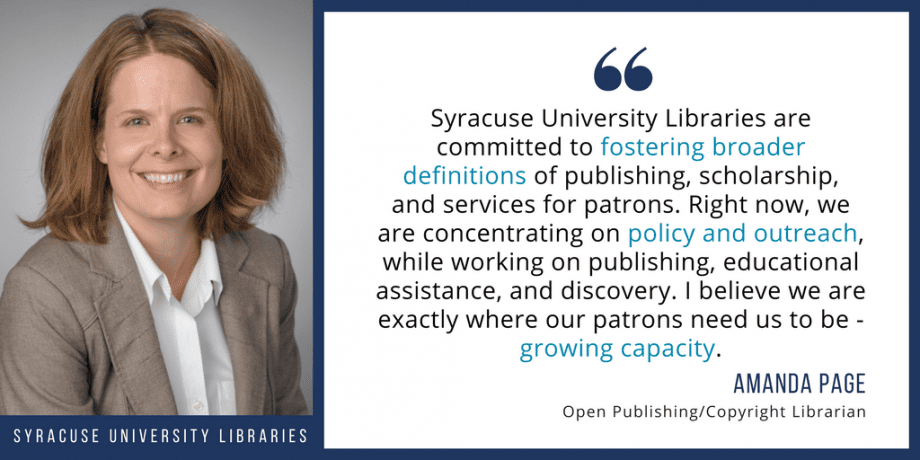As we gear up for the Library Publishing Forum and the start of a new membership year in July, we are publishing a series of member profiles. These profiles will showcase the wide variety of publishing work happening at member institutions, and celebrate our community’s contributions to the wider publishing landscape. Many thanks to the members who agreed to answer our questions! See all of the published profiles, and look for a new one each week until the Forum.
Check out Syracuse University’s latest entry in the Library Publishing Directory!
Tell us a bit about your publishing program.
In 2017, Syracuse University Libraries created Open Publishing Services formally. (I started in June, and we just hired a project coordinator). Within the department of Research and Scholarship, our menu of services includes support for various needs relating to scholarly communications, research support, education, and the Institutional Repository. We currently take on library publishing projects selectively as time allows but do not have a full-blown library publishing program (yet!) Projects we are involved in include hosting numerous open-access journals, the institutional repository, and our Syracuse Unbound imprint. Syracuse Unbound is an imprint to foster library publishing of open-access works through collaborations between the Syracuse University Libraries and the Syracuse University Press that was created in 2013, through which we complete occasional ad hoc publishing projects. Digital Commons, Open Journal Systems, WordPress, and Ensemble are the main platforms in our publishing workflows. We have a varied program that is growing capacity.
Over the last year, our publishing projects and institutional repository (SURFACE) work focused on enhancing quality publishing practices and specifically on increasing accessibility (ADA) standards, usability, and discovery for the Digital Commons platform, our websites, and content. This is ongoing and we are continually striving to improve. For example, a re-design of our institutional repository website, SURFACE, was completed in February, and we are implementing new ingest processes for accessibility standards, and integrating accessibility into our open-access educational work.
Tell us something you have accomplished with your program that you’re proud of – big or small.
One project I am proud of is Triple Triumph: Three Women in Medicine, a monograph we published through Syracuse Unbound in August 2017. I am proud of this project because it focuses on three female physicians, who have had remarkable careers and lives. I am proud to have been a part of the process in making the work openly available for anyone to read because I found inspiration and hope in the stories. Besides that, we started the project right after I came onboard in June, and it was a lot of fun to jump right into the work.

Looking ahead, what are you excited about, or what’s on the horizon for your program?
For me, building capacity for open-access and Open Publishing is exciting, and so is the fact that the SU Libraries are committed to fostering broader definitions of publishing, scholarship, and services for patrons. Right now, we are concentrating on policy and outreach, while working on publishing, educational assistance, and discovery. I believe we are exactly where our patrons need us to be – growing capacity.
Tell us about an obstacle you are facing in your work, or one that the field is facing as a whole.
It is my personal opinion that one challenge we face in scholarly communications concerns rights and permissions. A decade ago, I saw many more copyright transfer agreements than now. Today, it seems we have three commons types of agreements for authors, but I am sure there are more: a copyright transfer agreement, a publication agreement allowing a journal to publish with some rights for the author, and a publication agreement allowing a journal to publish with broad rights for the author plus use of a Creative Commons license or other open license. It is great that there are more re-use rights built into agreements now, and that has made me very happy! Thanks to those leading the way. The challenge is in pushing the envelope further, focusing on value-based work, and adding a focus on broad re-use rights in publication agreements and library licenses.
Tell us about your experience participating in the community of library publishers. Has that experience influenced you or your work?
I have enjoyed being a part of LPC this year and am confident that library publishers care about the reader and author perspective, all the while understanding the time it takes to ensure quality. I have had a welcoming and positive experience within the library publishing community this year and I look forward to diving into it even more.
